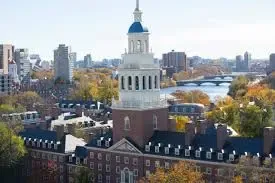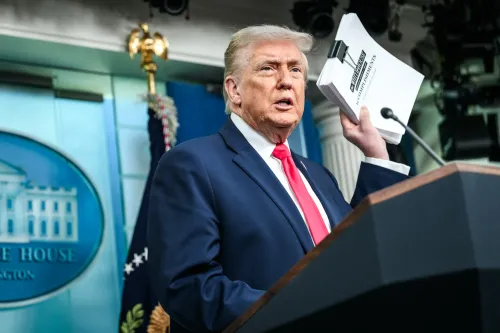Harvard's Federal Funding Halted Amid Tensions with Trump Administration

Synopsis
Key Takeaways
- Harvard's federal funding frozen due to non-compliance.
- Trump administration demands reforms in governance and hiring.
- Harvard maintains commitment to independence and civil rights.
- Escalating tensions on US campuses linked to ongoing protests.
- Contrast with Columbia University's compliance with federal scrutiny.
Washington, April 15 (NationPress) Harvard University is experiencing a significant financial challenge after the Donald Trump administration enacted a freeze on $2.2 billion in federal funding due to the university's refusal to meet a series of extensive demands concerning governance, campus policies, and civil rights enforcement.
The demands, first presented in early April, required the dismantling of diversity, equity, and inclusion (DEI) offices, cooperation with immigration authorities in evaluating international students, and broad reforms in hiring practices, admissions, and internal governance.
On Friday, the administration intensified the matter by issuing a more comprehensive list of requirements, which included conducting an audit of student and faculty political beliefs. In response, Harvard chose to publish the letter and reject the proposed conditions.
In a public letter to students and faculty, Harvard President Alan Garber reaffirmed the institution's stance against government pressure. “We will not negotiate over our independence or constitutional rights,” Garber stated. “No government should dictate what a private university teaches or who it hires and admits.”
The Joint Task Force to Combat Anti-Semitism, part of the Trump administration, announced the suspension of multi-year federal grants totaling $2.2 billion and a freeze on $60 million in existing government contracts.
The task force criticized Harvard’s stance, arguing, “Harvard’s response today reflects a mindset of entitlement that must be addressed. Taxpayer funding comes with the responsibility to uphold civil rights protections.”
This development occurs amidst escalating tensions on US campuses, many of which have been shaken by protests regarding Israel’s ongoing conflict in Gaza.
Numerous demonstrations have spiraled into clashes with law enforcement and counter-protesters. Critics, including President Donald Trump and various Republican legislators, have accused student demonstrators of endorsing Hamas, which is classified as a terrorist organization by the US government.
In March, the Department of Education initiated investigations into 60 institutions, including Harvard, for alleged anti-Semitic incidents. The funding freeze follows a previous review of $9 billion in federal assistance related to the university and its affiliates.
Garber emphasized that Harvard is dedicated to fostering open dialogue but cautioned against political overreach. “We are open to innovative ideas, but we will not comply with demands that exceed the lawful authority of any administration,” he declared.
The circumstances at Harvard stand in stark contrast to Columbia University, which recently consented to a series of reforms in response to similar federal scrutiny.
Meanwhile, two organizers of pro-Palestinian protests at Columbia are facing legal action from immigration authorities.
Harvard, which reported a $45 million surplus on $6.5 billion in revenue during the last fiscal year, now encounters a high-stakes confrontation that could alter the dynamics between prestigious academic institutions and the federal government.










